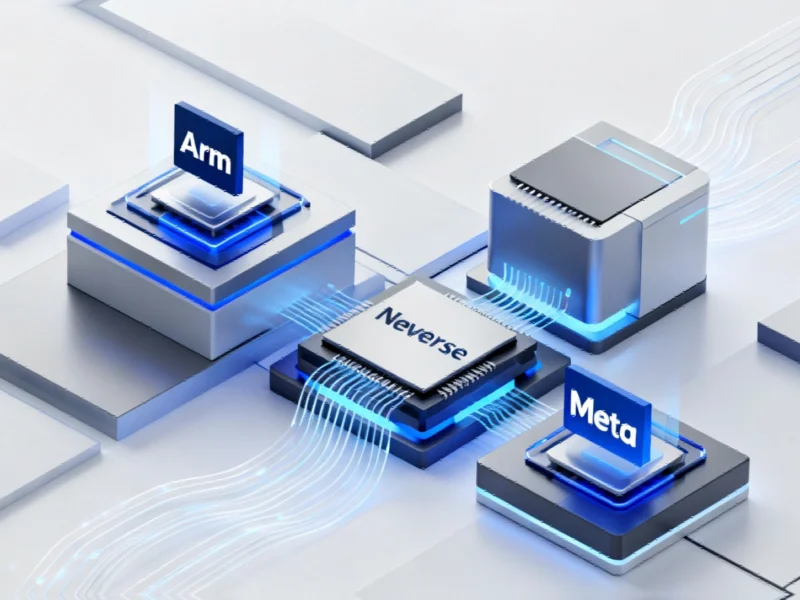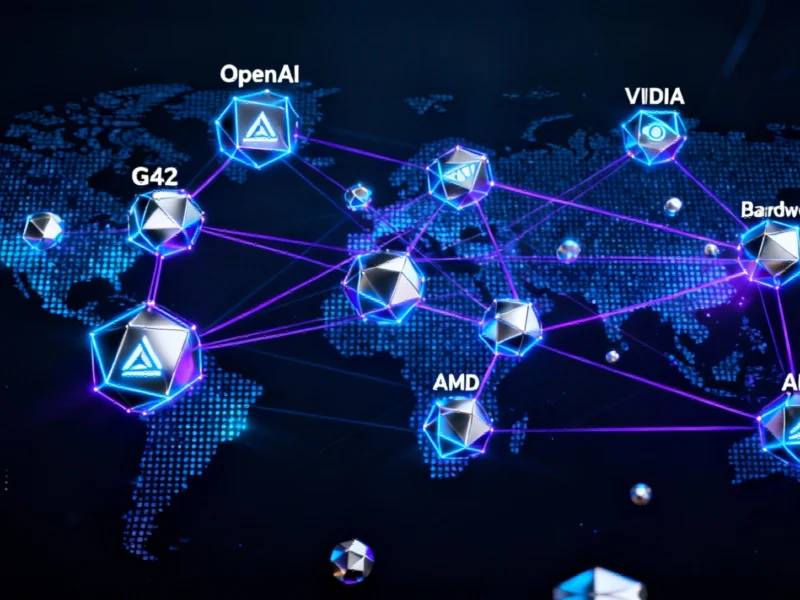Strategic Partnership Targets AI Performance and Power Optimization
In a significant move that could reshape AI infrastructure deployment, Meta has entered into a multi-year collaboration with chip architecture leader Arm to enhance the efficiency and scalability of its artificial intelligence systems. This strategic alliance represents a major commitment to optimizing AI performance across Meta’s extensive platform ecosystem, which serves billions of users worldwide.
The partnership centers on Meta’s adoption of Arm’s Neoverse computing platform to power critical AI workloads, including the sophisticated search ranking and recommendation engines that drive user engagement across Facebook, Instagram, and other Meta applications. This shift from traditional x86 architecture to Arm’s design philosophy signals a fundamental rethinking of how large-scale AI systems can achieve better performance while managing power consumption more effectively.
Technical Collaboration Extends Beyond Hardware
The collaboration extends deep into the software layer, with engineering teams from both companies working to optimize Meta’s core AI infrastructure technologies. This includes significant enhancements to Facebook’s General Matrix Multiplication (FBGEMM) library and PyTorch’s ExecuTorch Edge-inference runtime engine. These optimizations have yielded measurable improvements in inference efficiency and throughput, demonstrating the tangible benefits of hardware-software co-design.
Arm CEO Rene Haas emphasized the broader implications, stating that “AI’s next era will be defined by delivering efficiency at scale. Partnering with Meta, we’re uniting Arm’s performance-per-watt leadership with Meta’s AI innovation to bring smarter, more efficient intelligence everywhere – from milliwatts to megawatts.” This vision aligns with Meta’s ongoing strategic initiatives to enhance shareholder value through technological innovation.
Neoverse Platform Architecture and Capabilities
Arm’s Neoverse platform, first introduced in 2018, represents a comprehensive approach to infrastructure computing. The platform is organized into three distinct product families, each targeting specific compute requirements:
- V Series: Engineered for maximum performance in general-purpose computing applications
- N Series: Optimized for cloud-to-edge server deployments
- E Series: Designed specifically for edge computing environments
The introduction of Neoverse CSS in 2023 further accelerated adoption by enabling partners to develop specialized silicon solutions more rapidly and cost-effectively than traditional discrete IP approaches. This innovation comes at a time when companies across sectors, including consumer brands like Coty, are restructuring to focus on core competencies and technological advancement.
Open Source Contributions and Industry Impact
A notable aspect of the Meta-Arm partnership is its commitment to open source principles. The software improvements developed through this collaboration have been made available to the broader developer community, enabling other organizations to benefit from the efficiency gains achieved. This approach mirrors trends seen in other technology sectors, where major players like Alibaba are driving innovation through collaborative development.
Santosh Janardhan, Meta’s head of infrastructure, highlighted the transformative potential of this partnership: “From the experiences on our platforms to the devices we build, AI is transforming how people connect and create. Partnering with Arm enables us to efficiently scale that innovation to the more than three billion people who use Meta’s apps and technologies.”
Broader Implications for AI Infrastructure
The Meta-Arm collaboration represents a significant validation of Arm’s infrastructure strategy and could accelerate the adoption of Arm-based solutions across the AI industry. As organizations seek to balance computational demands with energy efficiency, the performance-per-watt advantages demonstrated by this partnership may influence infrastructure decisions throughout the technology sector.
This development aligns with broader industry trends where companies are leveraging AI to transform commerce and user experiences. The efficiency gains achieved through hardware-software optimization could establish new benchmarks for AI deployment at scale, potentially influencing how other technology giants approach their infrastructure roadmaps.
The partnership between Meta and Arm underscores the growing importance of specialized computing architectures in enabling the next generation of AI applications while addressing critical concerns around energy consumption and computational efficiency.
Based on reporting by {‘uri’: ‘datacenterdynamics.com’, ‘dataType’: ‘news’, ‘title’: ‘DCD’, ‘description’: ‘The ultimate source for data center news, analysis and opinion at https://t.co/LZ1IWZbvVu’, ‘location’: {‘type’: ‘place’, ‘geoNamesId’: ‘2643743’, ‘label’: {‘eng’: ‘London’}, ‘population’: 7556900, ‘lat’: 51.50853, ‘long’: -0.12574, ‘country’: {‘type’: ‘country’, ‘geoNamesId’: ‘2635167’, ‘label’: {‘eng’: ‘United Kingdom’}, ‘population’: 62348447, ‘lat’: 54.75844, ‘long’: -2.69531, ‘area’: 244820, ‘continent’: ‘Europe’}}, ‘locationValidated’: False, ‘ranking’: {‘importanceRank’: 344832, ‘alexaGlobalRank’: 62406, ‘alexaCountryRank’: 34716}}. This article aggregates information from publicly available sources. All trademarks and copyrights belong to their respective owners.



